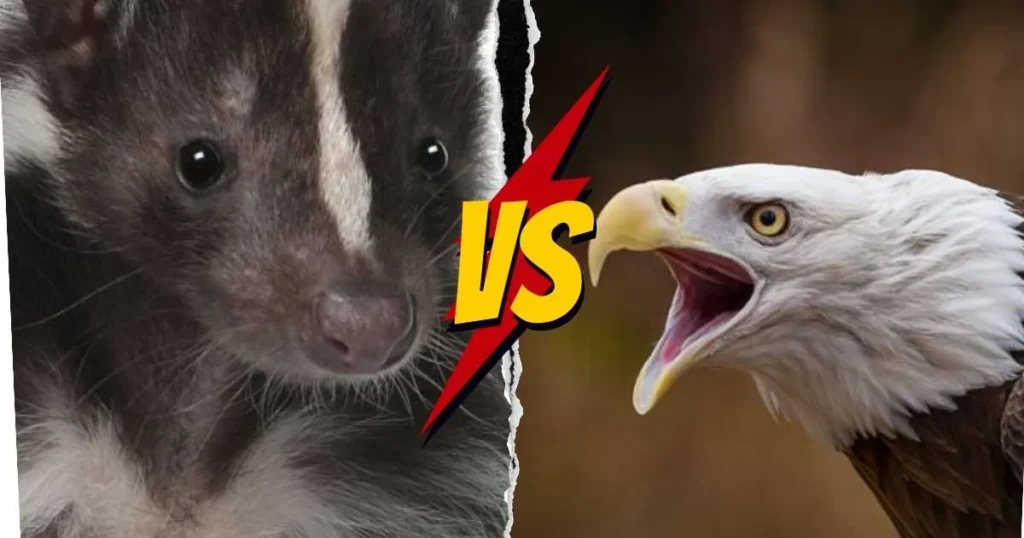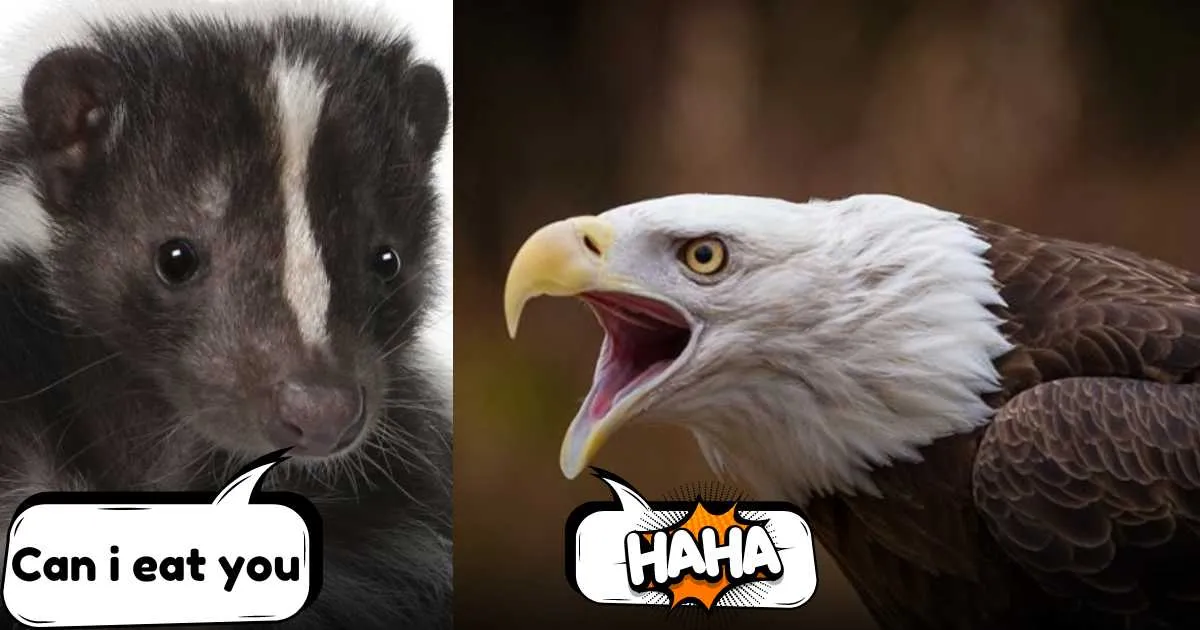Do Skunks Really Eat Eagles
Last updated on December 7th, 2024 at 10:19 pm
As a skunk owner and wildlife enthusiast, I’ve spent years observing the fascinating habits of these misunderstood creatures. One question I’ve encountered is: Do skunks eat eagles? The short and straightforward answer is no. Eagles are far too large, powerful, and formidable for skunks to hunt or consume. However, the interplay between skunks and eagles offers intriguing insights into nature’s food chain and predator-prey dynamics.
In this article, we’ll explore the dietary habits of skunks, their interactions with birds, and why eagles are unlikely to end up on a skunk’s menu.
What Do Skunks Typically Eat?
Skunks are omnivores with a varied diet that shifts based on availability. They are opportunistic feeders, consuming whatever is easiest to find. Here’s a breakdown of what skunks usually eat:
Animal-Based Foods
- Insects: Beetles, crickets, larvae, and grubs.
- Small Rodents: Mice, voles, and shrews.
- Birds and Eggs: Ground-nesting birds and their eggs, especially if nests are easily accessible.
- Reptiles and Amphibians: Frogs, small snakes, and lizards.
Plant-Based Foods
- Fruits: Berries, apples, cherries, and other seasonal fruits.
- Seeds and Nuts: A good source of energy.
- Vegetables: Corn, peas, and carrots.
Why Skunks Don’t Eat Eagles
Eagles are apex predators, sitting at the top of the food chain. They are large, powerful birds with keen eyesight, strong talons, and sharp beaks—traits that make them formidable opponents for any potential predator, including skunks.
Key Reasons Skunks Don’t Prey on Eagles
- Size and Strength: Eagles are much larger than skunks, making them virtually impossible for a skunk to overpower.
- Flight Capability: Eagles can escape most threats by taking flight, something a skunk cannot counter.
- Predatory Nature: Eagles are predators themselves and could easily injure or kill a skunk in self-defense.
- Behavioral Avoidance: Skunks are cautious and prefer easier, less risky meals, like small rodents or insects.
While skunks may raid ground-nesting bird nests for eggs or young chicks, eagle nests are typically high in trees or cliffs, out of a skunk’s reach.

Skunks and Birds: Understanding the Connection
Skunks are known to interact with birds in certain scenarios, particularly when it comes to ground-nesting species. Let’s explore the dynamics between skunks and birds and how these interactions differ from their non-relationship with eagles.
Birds in a Skunk’s Diet
- Ground-Nesting Birds: Skunks may eat eggs or chicks from ground-nesting species such as quail, pheasants, or plovers.
- Opportunistic Feeding: If a bird is injured or otherwise unable to escape, a skunk may consume it. This is rare and typically involves smaller, weaker birds.
Eagles in Comparison
Eagles, on the other hand:
- Nest in tall trees or cliffs, far beyond a skunk’s reach.
- Are powerful enough to defend themselves against most predators, including skunks.
- Do not exhibit behaviors that make them vulnerable to skunk predation.
How Eagles and Skunks Coexist in Ecosystems
Though skunks and eagles occupy vastly different ecological niches, they share overlapping territories in forests, grasslands, and other habitats. Their coexistence is an example of nature’s balance, where species interact without direct conflict.
The Role of Skunks
- Skunks help control populations of insects, rodents, and other small creatures.
- They act as scavengers, cleaning up carrion and organic waste.
The Role of Eagles
They maintain balance by regulating prey populations and preventing overpopulation.
Eagles prey on larger animals, such as fish, rabbits, and smaller birds.

Misconceptions About Skunks as Predators
Skunks are often misunderstood as aggressive hunters, but in reality, they are scavengers and opportunistic feeders. Here are some common myths:
Myth 1: Skunks Hunt Large Birds
While skunks may eat smaller birds or their eggs, they are not equipped to hunt large, predatory birds like eagles.
Myth 2: Skunks are Aggressive Predators
Skunks are more defensive than offensive. Their primary weapon is their spray, used to deter predators rather than hunt prey.
Myth 3: Skunks Pose a Threat to All Wildlife
Skunks mainly target insects and small rodents, playing a beneficial role in ecosystems by controlling pest populations.
Frequently Asked Questions
Do skunks eat birds?
Yes, skunks may eat smaller birds or their eggs, particularly ground-nesting species. However, they rarely target fully grown birds due to their size and mobility.
Are skunks a threat to eagle nests?
No, skunks are not a threat to eagle nests. Eagles typically nest in high locations inaccessible to skunks.
What are a skunk’s natural predators?
Predators of skunks include great horned owls, coyotes, bobcats, and foxes. Eagles may also prey on skunks, particularly young or weak individuals.
Conclusion
While skunks are opportunistic feeders with a varied diet, eagles are far beyond their scope as prey. The size, strength, and predatory nature of eagles make them an impossible target for skunks. Instead, skunks focus on smaller, more accessible food sources like insects, rodents, and the occasional ground-nesting bird egg.
As a skunk owner, I’ve come to admire their adaptability and role in maintaining ecological balance. Understanding their eating habits helps debunk myths and appreciate these misunderstood creatures for the unique contributions they make to the environment. So, next time someone asks if skunks eat eagles, you’ll know the answer—and the fascinating reasoning behind it!

